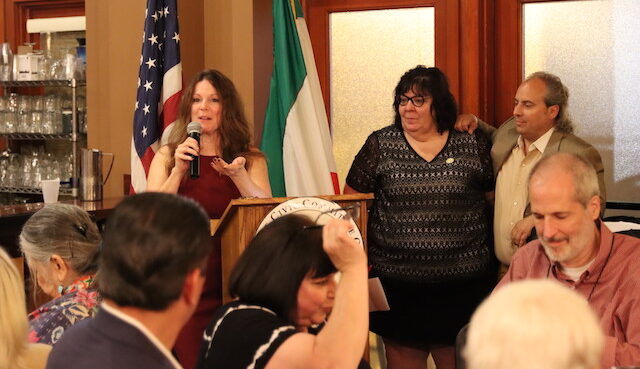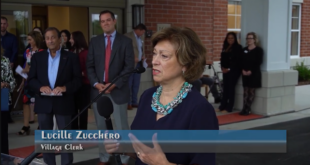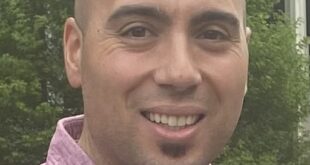An educator of Italian descent, Diana Hartmann is spearheading a drive to introduce Italian-American history into grade and high school curricula across the state.
In this era of ever-expanding inclusion, Italian Americans have long been the odd community out. That may soon change in Illinois if Diana Hartmann has anything to do with it.
An educational administrator of Italian descent, Hartmann has watched as books about Italian and Italian-American history and culture have disappeared from the shelves of school libraries. Last fall, she took action to reverse the trend.
“I wanted to make sure that our contributions and experiences received the credit they were due,” says Hartmann, who was recently elected the regional superintendent of schools in McHenry County. “But I wanted to make sure we weren’t reinventing the wheel.”
 A nationwide search led her to the New Jersey Italian Heritage Commission, which was empowered by the state legislature to create curricula for the teaching of Italian-American history at the grade and high school levels.
A nationwide search led her to the New Jersey Italian Heritage Commission, which was empowered by the state legislature to create curricula for the teaching of Italian-American history at the grade and high school levels.
Operating under the aegis of the Joint Civic Committee of Italian Americans, Hartmann coordinated meetings between commission Chairman Robert DiBiase, JCCIA President Ron Onesti and New Jersey state officials. “In the end, they gifted the JCCIA their entire curriculum to post, distribute and use throughout Illinois,” Hartmann says. “It was remarkably gracious of them.”
Now, she’s working on behalf of the JCCIA along with State Rep. Anthony DeLuca to enact similar legislation in Illinois. Introduced as H.B. 5110, the Italian American History Act would open the door to the study of everything from ancient Rome to 20th-century Italian-American scientist Dr. Catherine DeAngelis.
Hartmann recently spoke with Fra Noi about the road she’s traveled to get to this pivot point and the role the community can play in completing the journey.
Fra Noi: First, a little about you. Why did you decide to go into education?
Hartmann: It wasn’t my first career. I graduated college with a bachelor’s in economics and went into business management. The funny thing was that, from a young age, I was always tutoring or teaching in some capacity. Eventually, I understood that I wanted to be more about serving people than just making money. I went back to school to get a master’s in secondary education and kept going to earn an additional master’s in educational leadership, educational specialist degree, which is a practitioner’s doctorate.
Fra Noi: Why did you pursue an administrative path?
Hartmann: Leadership was always a part of my makeup. I was awarded the Hugh O’Brian Youth Foundation Leadership Award when I was 15, which set me on the path to becoming a servant leader. It was a natural shift from guiding students to guiding teachers.
Fra Noi: How did you first get involved in the push to include Italian-American history in our schools’ curricula?
Hartmann: I was frustrated when the schools I entered were giving away books on Columbus and Christmas in Italy. At the same time, there was a conscious shift in focus to what our state superintendent called “non-white” areas of study. While I welcome information on any ethnic group’s contributions, I don’t think it should be done at the expense of other groups.
Fra Noi: What about Italian-American history is worthy of inclusion?
Hartmann: The great waves of Italian immigration from the late 1800s to the mid-1900s have lessons for us all. During this dynamic period in American history, Italian immigrants were portrayed as criminals and lowlifes, denied jobs and housing, and even killed. And yet the vast majority were law-abiding citizens who toiled tirelessly at often-menial jobs to help build America into an international powerhouse.
Negative portrayals and prejudice persisted throughout the 20th century, while the descendants of these immigrants distinguished themselves in every field of endeavor. Sharing these stories with our students will help undo the stereotypes that have dogged our community for more than 150 years. It also underscores what every ethnic group in America ultimately has in common: We’ve all faced challenges that we’ve had to overcome.
Fra Noi: Is there a precedent for this sort of legislative initiative?
Hartmann: Absolutely. Currently, Illinois-mandated units of study include women in history, Black history, history of people with disabilities, the Inclusive Curriculum Law, the Asian American History Act and the Irish Famine unit.
Fra Noi: Why do you think our story isn’t being told?
Hartmann: The histories of most white ethnic groups tend to be lumped together. If we crowd out the individual ethnicities of what is now considered the Caucasian group while teaching history, we deny access to these enlightening experiences.
Fra Noi: Shed a little light on New Jersey’s curriculum.
Hartmann: It’s remarkably comprehensive, ranging from kindergarten to high school. On the younger end of the scale, you’ll find modules on Pinocchio, La Befana and Commedia dell’Arte. For the older students, there are more challenging topics like the lynching of Sicilian immigrants in New Orleans in 1890 and the internment of Italian nationals in America during World War II. And it covers thousands of years, from ancient Rome and the Renaissance to modern science and space travel.
Fra Noi: Tell me about the role Rep. Anthony DeLuca has played in getting this initiative off the ground and moving forward.
Hartmann: He’s been pivotal in our efforts. We brought the proposal for an Italian American History Act to him, and he agreed to sponsor it in the form of H.B. 5110. Since then, he has been instrumental in helping us identify key members of the House to inform them of the need for the act.
Fra Noi: Has being named regional superintendent of schools in McHenry County helped?
Hartmann: Most definitely. It has put me in direct contact with the Illinois Board of Education and the state superintendent, in addition to the lawmakers in our county.
Fra Noi: Where are we currently at with the legislation?
Hartmann: In the last legislative session, it was stuck in committee along with the Indigenous People’s History Act. Our next opportunity will be the fall legislative session.
Fra Noi: What can the community do to encourage passage?
Hartmann: When the bill finally enters the legislative process, it’s crucial for Italian Americans and others across the state to sound off in favor of the bill. The Asian American History Act passed on the strength of only 600 letters and emails of support. Imagine the impact if we could generate 10 times that enthusiasm. We will want to inundate representatives’ and senators’ offices with support. And we may only have a few days or even 24 hours to act, so be ready to move quickly!
Fra Noi will send out a dedicated e-blast encouraging and facilitating support of H.B. 5110 when the time is ripe. If you don’t already receive our monthly e-blast and you’d like to sign up, send an email to info@franoi.com, and we’ll add you to our list.
To view the New Jersey Italian-American history curriculum, click here.
The above appears in the June 2022 issue of the print version of Fra Noi. Our gorgeous, monthly magazine contains a veritable feast of news and views, profiles and features, entertainment and culture. To subscribe, click here.
 Fra Noi Embrace Your Inner Italian
Fra Noi Embrace Your Inner Italian








One comment
Pingback: franoi.com: Curricular revolutionary Diana Hartmann – Fra Noi – Urbanity Magazine